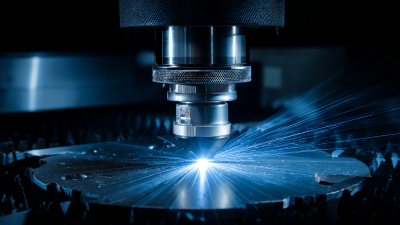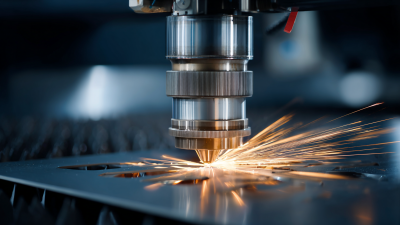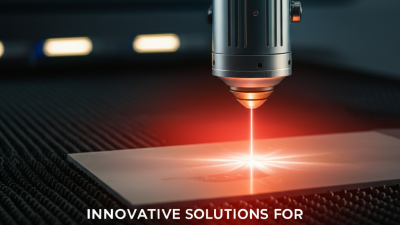- Grow Your Business with fortune laser!
- Mobile/WhatsApp:+86 13682329165
- jason@fortunelaser.com
How to Choose the Right Laser Welding Machine for Your Business Needs
Table of Contents
- Factors to Consider When Assessing Laser Welding Machine Specifications
- Understanding the Different Types of Laser Welding Technologies Available
- Evaluating Power Requirements for Effective Laser Welding Performance
- Analyzing Material Compatibility for Optimal Laser Welding Results
- Cost-Benefit Analysis of Investing in a Laser Welding Machine
- Assessing After-Sales Support and Maintenance Services in the Industry
- FAQS
- Conclusion
- Related Posts
In today's rapidly evolving industrial landscape, selecting the right Laser Welding Machine is crucial for businesses aiming to enhance productivity and ensure precision. According to a report by MarketsandMarkets, the global laser welding market is projected to reach USD 10.5 billion by 2025, growing at a CAGR of 5.1% from 2020. This growth reflects the increasing demand for automation and efficiency in manufacturing processes. Fortune Laser Technology Co., Ltd., founded in 2016 and headquartered in Shenzhen City, stands at the forefront of this trend as a professional manufacturer of industrial laser equipment, integrating R&D, production, sales, and maintenance services. Choosing a suitable laser welding machine can significantly affect a company's operational efficiency and product quality, highlighting the importance of making an informed decision based on specific business needs and technical specifications.

Factors to Consider When Assessing Laser Welding Machine Specifications
When choosing the right laser welding machine for your business needs, it is crucial to consider several specifications that directly influence performance and outcomes. One of the primary factors is local weld geometry, which can significantly affect the fatigue behavior of welded joints. Understanding how variations in geometry can lead to differing stress and concentration factors will aid in identifying a machine that suits your specific application requirements.
Additionally, evaluating the material compatibility and susceptibility to solidification cracking during the welding process is essential. Recent investigations have shown that materials such as TRIP steel with high phosphorus are more prone to issues during laser welding, whereas DP steel with low phosphorus demonstrates greater stability. Therefore, selecting a laser welding machine that offers flexibility in handling various materials and accounts for these material-specific challenges will enhance the quality and durability of your welds in production environments.
Understanding the Different Types of Laser Welding Technologies Available
When selecting a laser welding machine, it is crucial to understand the various types of laser welding technologies available. The most common types include fiber laser welding, CO2 laser welding, and Nd:YAG laser welding. Fiber lasers are known for their high efficiency and quality, making them ideal for welding thin materials and achieving precision. This technology offers a higher power density and can seamlessly weld various metals, providing flexibility for different applications.
On the other hand, CO2 lasers are typically used for thicker materials and larger welds. They deliver excellent results on non-metal materials such as plastics and ceramics, making them suitable for industries that require diverse material handling. Additionally, Nd:YAG lasers, which utilize solid-state technology, are popular for their ability to operate in pulsed or continuous modes, providing versatility in welding. Each technology has unique advantages and applications, so understanding these distinctions will help businesses choose a laser welding machine that best fits their specific operational requirements.
Laser Welding Machine Technology Comparison
Evaluating Power Requirements for Effective Laser Welding Performance
When choosing the right laser welding machine for your business needs, evaluating power requirements is crucial for achieving effective performance. The recent trends in laser welding technology indicate that higher power levels can improve the quality of welds, especially in applications involving dissimilar materials such as copper and aluminum, which are common in battery manufacturing. A study highlighted that variations in power input directly influence the performance of joints made from these materials, making it essential to select a machine that can deliver consistent power accurately.

Tips: Consider machines with adjustable power settings to meet varying project requirements. Additionally, look for systems that have been validated for thermal damage resistance, which can be particularly beneficial when working with advanced composite materials.
The integration of materials like carbon nanotubes into aluminum alloys during laser welding has also shown promising results, indicating that innovative material combinations can enhance the strength and sustainability of welds. Choosing a laser welding machine that accommodates such developments can improve your production capabilities and contribute to more sustainable manufacturing practices.
Analyzing Material Compatibility for Optimal Laser Welding Results
When selecting a laser welding machine, understanding material compatibility is crucial for achieving optimal results. Different materials respond uniquely to laser welding, influencing factors such as power settings, beam quality, and welding speed. For instance, metals like stainless steel may require specific laser types and wavelengths to achieve precise and clean joints, while polymers and composites might necessitate different approaches to avoid material degradation during the process.
Moreover, the thickness and surface condition of the materials play significant roles in determining the appropriate laser parameters. Thicker materials typically require higher power levels and slower welding speeds to ensure adequate fusion, while a clean surface can significantly enhance the quality of the weld. It's essential to conduct compatibility analyses, including testing various power settings and beam profiles on the materials intended for use, to fine-tune the laser welding process. This careful consideration ultimately leads to improved weld integrity and durability, fitting the specific needs of your business.
How to Choose the Right Laser Welding Machine for Your Business Needs
| Material Type | Laser Power | Welding Speed | Thickness Range | Recommended Laser Type |
|---|---|---|---|---|
| Mild Steel | 1000-3000 W | 1-10 m/min | 0.5 - 15 mm | Fiber Laser |
| Stainless Steel | 1500-6000 W | 2-8 m/min | 0.3 - 12 mm | Fiber Laser |
| Aluminum | 2000-5000 W | 1-5 m/min | 0.5 - 10 mm | YAG Laser |
| Copper | 2000-8000 W | 0.5-3 m/min | 0.5 - 5 mm | Fiber Laser |
| Titanium | 1500-6000 W | 1-6 m/min | 0.5 - 8 mm | Fiber Laser |
Cost-Benefit Analysis of Investing in a Laser Welding Machine
Investing in a laser welding machine can significantly enhance the efficiency and quality of manufacturing processes. With the global laser welding machine market projected to grow from USD 2.7 billion in 2024 to USD 4.7 billion by 2035, businesses are increasingly recognizing the long-term benefits of such technology. The initial investment may seem substantial, but when analyzed through a cost-benefit lens, the advantages often outweigh the costs.
Laser welding machines offer precision, reduced material waste, and shorter production times, making them a superior alternative to traditional welding methods.
Moreover, the ongoing advancements in laser technology are transforming market dynamics, driving further integration of artificial intelligence in manufacturing processes. As laser welding machines become more affordable and accessible, their adoption could lead to considerable cost savings over time. A detailed assessment of operational efficiencies, labor costs, and product quality will provide businesses with a clearer picture of the return on investment. Ultimately, investing in a laser welding machine not only represents an opportunity for growth but also positions a company favorably within an evolving industrial landscape.
Assessing After-Sales Support and Maintenance Services in the Industry
 When selecting a laser welding machine for your business, evaluating the after-sales support and maintenance services provided by the manufacturer is crucial. A reliable after-sales support system ensures that you have access to technical assistance, troubleshooting guidance, and timely repairs. In a field where precision is essential, prolonged downtime due to equipment failure can lead to significant losses. Thus, businesses should prioritize suppliers who offer comprehensive support, including installation services, operator training, and readily available customer service.
When selecting a laser welding machine for your business, evaluating the after-sales support and maintenance services provided by the manufacturer is crucial. A reliable after-sales support system ensures that you have access to technical assistance, troubleshooting guidance, and timely repairs. In a field where precision is essential, prolonged downtime due to equipment failure can lead to significant losses. Thus, businesses should prioritize suppliers who offer comprehensive support, including installation services, operator training, and readily available customer service.
Additionally, maintenance services should not be overlooked. Regular maintenance contracts can help ensure that your laser welding machine operates at optimal performance levels. A good maintenance program will typically include routine inspections, software updates, and parts replacements as needed. This proactive approach not only extends the lifespan of your equipment but also minimizes unexpected breakdowns. Therefore, before making a purchase, investigate the manufacturer’s reputation for after-sales service and the specifics of their maintenance plans to make an informed decision that aligns with your operational needs.
FAQS
: Key factors include local weld geometry, material compatibility, susceptibility to solidification cracking, and variations in geometry that affect stress and concentration factors.
Local weld geometry significantly influences the fatigue behavior of welded joints, which is critical for determining the suitability of a laser welding machine for specific applications.
Materials like TRIP steel with high phosphorus content are more prone to solidification cracking, while DP steel with low phosphorus shows greater stability during the welding process.
Reliable after-sales support ensures access to technical assistance, troubleshooting guidance, and timely repairs, minimizing downtime and potential losses for businesses.
Look for comprehensive support that includes installation services, operator training, customer service, and regular maintenance contracts to keep the equipment operating at optimal levels.
Regular maintenance helps ensure optimal performance, extends equipment lifespan, and minimizes unexpected breakdowns through routine inspections and timely software updates.
Operator training is crucial for maximizing the machine’s capabilities and ensuring high-quality welds, ultimately contributing to operational efficiency.
Investigate customer reviews, testimonials, and the specifics of their maintenance plans to evaluate a manufacturer's reputation for providing effective after-sales support.
A flexible laser welding machine can handle various materials and adapt to material-specific challenges, enhancing the quality and durability of the welds produced in production environments.
Ignoring maintenance needs can lead to equipment failures, unexpected breakdowns, and reduced operational efficiency, ultimately affecting production and profitability.
Conclusion
Choosing the right laser welding machine for your business is crucial for ensuring efficiency and quality in your operations. Key factors to consider include the specifications of the machine, such as power requirements and material compatibility, which can significantly impact the performance and results of your welding projects. Understanding the different types of laser welding technologies available is essential for selecting a machine that meets your specific needs.
Additionally, conducting a cost-benefit analysis will help you evaluate the financial implications of investing in a laser welding machine. It’s also important to assess the after-sales support and maintenance services provided, as this can influence the longevity and reliability of your investment. At Fortune Laser Technology Co., Ltd., we offer a range of industrial laser equipment backed by comprehensive support, ensuring that your business can thrive with the right tools at your disposal.
Related Posts
-

Solutions for Streamlined Manufacturing with Best Fiber Laser Welder
-

7 Key Advantages of Using High Power Laser Cutters in Modern Manufacturing
-

Exploring the Unique Features and Applications of the Best Precise Fiber Laser Cutters in Modern Manufacturing
-

Ultimate Guide to Selecting the Best Laser Welders for Global Manufacturing Efficiency
-

Ultimate Guide to Choosing the Right Metal Sheet Fiber Laser Cutter for Your Needs
-

Innovative Solutions for Effective Laser Cleaning High Power Technology





